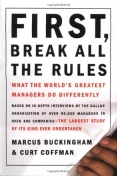BKMT READING GUIDES
First, Break All the Rules: What the World's Greatest Managers Do Differently
by Marcus Buckingham, Curt Coffman
Hardcover : 271 pages
1 club reading this now
0 members have read this book
Introduction
The greatest managers in the world seem to have little in common. They differ in sex, age, and race. They employ vastly different styles and focus on different goals. Yet despite their differences, great managers share one common trait: They do not hesitate to break virtually every rule held sacred by conventional wisdom. They do not believe that, with enough training, a person can achieve anything he sets his mind to. They do not try to help people overcome their weaknesses. They consistently disregard the golden rule. And, yes, they even play favorites. This amazing book explains why.
Marcus Buckingham and Curt Coffman of the Gallup Organization present the remarkable findings of their massive in-depth study of great managers across a wide variety of situations. Some were in leadership positions. Others were front-line supervisors. Some were in Fortune 500 companies; others were key players in small, entrepreneurial companies. Whatever their situations, the managers who ultimately became the focus of Gallup's research were invariably those who excelled at turning each employee's talent into performance.
In today's tight labor markets, companies compete to find and keep the best employees, using pay, benefits, promotions, and training. But these well-intentioned efforts often miss the mark. The front-line manager is the key to attracting and retaining talented employees. No matter how generous its pay or how renowned its training, the company that lacks great front-line managers will suffer.
Buckingham and Coffman explain how the best managers select an employee for talent rather than for skills or experience; how they set expectations for him or her -- they define the right outcomes rather than the right steps; how they motivate people -- they build on each person's unique strengths rather than trying to fix his weaknesses; and, finally, how great managers develop people -- they find the right fit for each person, not the next rung on the ladder. And perhaps most important, this research -- which initially generated thousands of different survey questions on the subject of employee opinion -- finally produced the twelve simple questions that work to distinguish the strongest departments of a company from all the rest. This book is the first to present this essential measuring stick and to prove the link between employee opinions and productivity, profit, customer satisfaction, and the rate of turnover.
There are vital performance and career lessons here for managers at every level, and, best of all, the book shows you how to apply them to your own situation.
Editorial Review
Marcus Buckingham and Curt Coffman expose the fallacies of standard management thinking in First, Break All the Rules: What the World's Greatest Managers Do Differently. In seven chapters, the two consultants for the Gallup Organization debunk some dearly held notions about management, such as "treat people as you like to be treated"; "people are capable of almost anything"; and "a manager's role is diminishing in today's economy." "Great managers are revolutionaries," the authors write. "This book will take you inside the minds of these managers to explain why they have toppled conventional wisdom and reveal the new truths they have forged in its place."The authors have culled their observations from more than 80,000 interviews conducted by Gallup during the past 25 years. Quoting leaders such as basketball coach Phil Jackson, Buckingham and Coffman outline "four keys" to becoming an excellent manager: Finding the right fit for employees, focusing on strengths of employees, defining the right results, and selecting staff for talent--not just knowledge and skills. First, Break All the Rules offers specific techniques for helping people perform better on the job. For instance, the authors show ways to structure a trial period for a new worker and how to create a pay plan that rewards people for their expertise instead of how fast they climb the company ladder. "The point is to focus people toward performance," they write. "The manager is, and should be, totally responsible for this." Written in plain English and well organized, this book tells you exactly how to improve as a supervisor. --Dan Ring
Discussion Questions
No discussion questions at this time.Book Club Recommendations
Recommended to book clubs by 0 of 0 members.
Book Club HQ to over 90,000+ book clubs and ready to welcome yours.
Get free weekly updates on top club picks, book giveaways, author events and more








